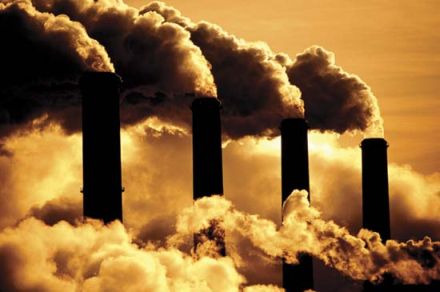When President Obama spoke to the students at Georgetown University yesterday he began with the imagery of the December 1968 flight of Apollo 8 and described the photograph of Earth which the astronauts took – “a marble of blue oceans, and green forests and brown mountains brushed with white clouds.”
Apollo 8 was the first time human space travelers had gazed down upon our planet from afar. What it showed was just how fortunate we were to be inhabitants of such a benign and beautiful place.
But the President continued. He described Earth observations by scientists from even before 1968 to today that indicated changes were happening on the planet and that those changes were a consequence of human activities. The President didn’t skirt around the subject. He stated, “science, accumulated and reviewed over decades, tells us that our planet is changing in ways that will have profound impacts on all of humankind.” He went on to describe the recent past, “the 12 warmest years in recorded history have all come in the last 15 years,” and “last year, temperatures in some areas of the ocean reached record highs, and ice in the Arctic shrank to its smallest size on record.”
The President went on asking if “we will have the courage to act” on the overwhelming evidence, almost universally supported by scientists, of human-induced climate change . The percentage he quoted was 97% including world-renowned physicists, chemists, climatologists, geologists, paleontologists and even some former climate science deniers.
And as he spoke to the students he exclaimed, “I refuse to condemn your generation and future generations to a planet that’s beyond fixing.” These are welcome words from a world leader and from a nation who along with China represent the biggest greenhouse gas emitters on our planet.
In past postings I have written about China’s efforts to deal with carbon emissions. It is now gratifying to see the United States move from a lukewarm approach to concerted action to address carbon pollution. I have also stated in previous postings that the biggest threat to our atmosphere comes from coal-fired power plants and their emissions, and from politicians who bury their heads in the sand by talking about improbable technologies like “clean coal.” This is true for the United States, China and Canada, where I live, let alone other countries around the world.
I have faulted President Obama for what I have considered a public relations approach to the issue of climate change up until now. That polls and elections have driven policy rather than scientific certainty. And I continue to wonder when the nations of the world will make a “Manhattan Project” investment in developing an economy not built around the energy derived from burning fossil fuels.
So parts of the President’s speech to me seemed so far removed from addressing the issue of climate change which was supposedly his main message. Instead he talked about the revival of domestic oil and gas production, job creation and the issue of reducing American dependency on foreign fossil fuel sources. I guess this was a sop to those on the American right who think the President is out to destroy “Big Oil.” Clearly he is not.
So what concrete announcements about policy came from yesterday’s speech?
- a plan to double renewable energy capacity from wind and sun to heat and light up 6 million American homes by 2020.
- a commitment from the Department of Defense to install 3 Gigawatts of renewable power on military bases.
- a commitment by the federal government to purchase 20% of its energy requirement from renewable sources by 2020.
- the federal funding of coastal projects to reduce flood risks.
- a partnering with the private sector to bring technological know-how to other countries to assist them in tackling climate change.
- an end to American funding of new coal-fired power plants built overseas unless they deploy carbon-capture technology.
- a new initiative to create a global free trade agreement on clean energy technology, environmental goods and services and the development a global low-carbon economy.
- and a commitment to reach an international agreement on carbon pollution that produces concrete actions and results.
President Obama, in one part of his speech, addressed the ongoing issue of the Keystone XL Pipeline. Here are his exact words:
“Now, I know there’s been, for example, a lot of controversy surrounding the proposal to build a pipeline, the Keystone pipeline, that would carry oil from Canadian tar sands down to refineries in the Gulf. And the State Department is going through the final stages of evaluating the proposal. That’s how it’s always been done. But I do want to be clear: Allowing the Keystone pipeline to be built requires a finding that doing so would be in our nation’s interest. And our national interest will be served only if this project does not significantly exacerbate the problem of carbon pollution. The net effects of the pipeline’s impact on our climate will be absolutely critical to determining whether this project is allowed to go forward. It’s relevant.”
It was interesting to read in my two morning newspapers the interpretation of what the President was stating. In one paper the comments by the President indicated a rejection of the pipeline. While in the other the comments were interpreted as a conditional OK to proceed.
As I have written in the past, the issue of Keystone and climate change is more symbolic than real. Environmentalists have drawn a line in the sand over shipping bitumen by pipeline from Alberta to Texas. The President called the Alberta oil sands, “tar sands,” considered a pejorative phrase by Alberta oil producers and the Canadian government. For environmentalists this was a hint that the pipeline would ultimately be rejected. But those in support of the industry believe that the actual operation of the pipeline will be far less carbon intensive than when, not if, the oil finally gets shipped to Texas refineries. That’s because the oil would go by rail if no pipeline exists. By rail oil sands production would then include the additional carbon output from train transportation. And in the event of a derailment, the potential risk to the environment would probably be greater than any leak from a pipeline.
What the President didn’t include in his climate change speech was any commitment to a carbon tax or a cap-and-trade scheme. What does this say about politics in America today? How can a President no longer running for re-election and therefore no longer in fear of losing, not implement what could be the fastest way to begin addressing rising carbon pollution in the atmosphere.









